UN Sustainable Development Goals
Te Herenga Waka—Victoria University of Wellington's leadership in the area of sustainability is reflected in its ranking among the top universities in the world for the social impact of universities and their commitment to the UN Sustainable Development Goals (SDGs).
We contribute to the SDGs through our research, teaching, engagement, and operations. Check out our work on each SDG below.
SDG 1: Pōhara kore | No Poverty
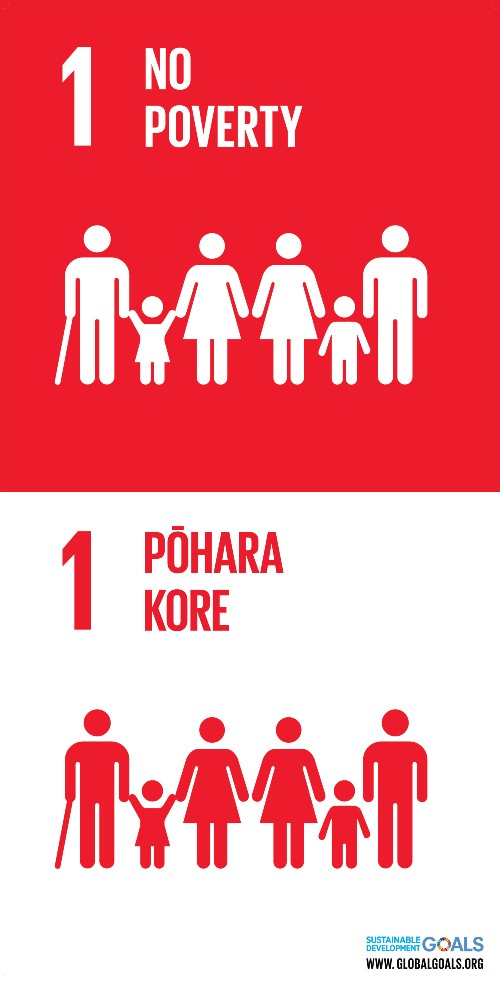 Citizens from eligible countries can choose to study at our University through New Zealand Foreign Affairs & Trade's New Zealand Scholarships scheme. The purpose of these scholarships is to enhance the skills, training, and knowledge of the recipients, and also to build sustainable development capacity for their home country, including in the area of poverty reduction.
Citizens from eligible countries can choose to study at our University through New Zealand Foreign Affairs & Trade's New Zealand Scholarships scheme. The purpose of these scholarships is to enhance the skills, training, and knowledge of the recipients, and also to build sustainable development capacity for their home country, including in the area of poverty reduction.
Students who are experiencing financial difficulty can access Putea Awhina—Hardship Fund. Hardship Fund Equity Grants are available to encourage students who are facing financial hardship to continue their studies. Applications are open to all current students, whether domestic, international, undergraduate, postgraduate, part or full time.
The Ngā Hoe a Kupe Pathfinder Scholarships were launched in 2020 to increase the participation and success of Māori, Pasifika, low socio-economic, and refugee-background students.
The Roy McKenzie Centre for the Study of Families and Children studies the connection between family context and child inequality, as well as resilience in Māori whānau and Pacific families.
SDG 2: Hemokai kore | Zero Hunger
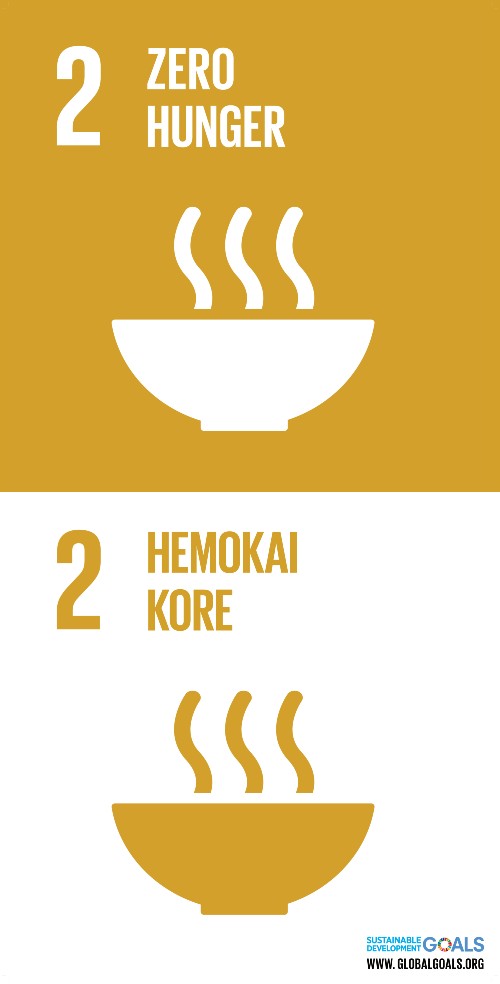
Victoria University of Wellington Students Association (VUWSA) and the University have partnered together to deliver the Community Pantry, a free food parcel service for students in need.
Free bread is delivered to the VUWSA office every Friday Students are welcome to help themselves to as much as they need.
SDG 3: Mauri ora | Good Health and Wellbeing
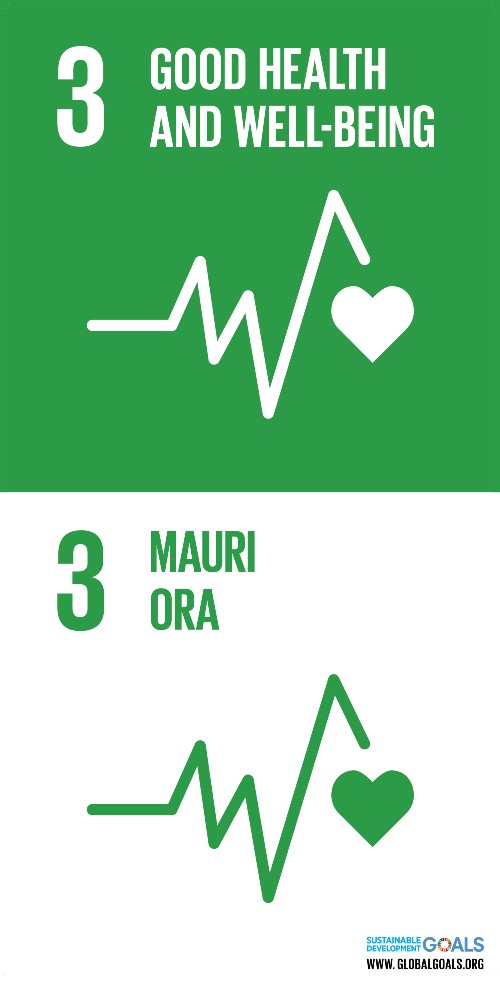 The health and wellbeing of students and staff is integral to all we do. The University has embedded wellbeing into our academic mandates, business practices, and everyday operations.
The health and wellbeing of students and staff is integral to all we do. The University has embedded wellbeing into our academic mandates, business practices, and everyday operations.
The Wellington Faculty of Health brings together researchers and teachers from across the University to prepare the next generation of health sector professionals. The Faculty is home to the School of Health and the School of Nursing, Midwifery, and Health Practice, plus two centres—the Health Services Research Centre and Centre for Women’s Health Research.
We also host the Malaghan Institute of Medical Research. It is New Zealand’s premier vaccine and immunology research centre and is a charitable trust. The Malaghan's scientists are dedicated to the prevention and treatment of cancer, asthma and allergy, multiple sclerosis, and infectious diseases such as tuberculosis and human hookworm, through the development of more effective immunological based disease therapies.
Mauri Ora—Student Health and Counselling is a hub for student healthcare on campus. Services include student counselling, a physiotherapy clinic, and a pharmacy.
University Recreation Wellington provides sports, recreation, wellbeing, fitness, and club services for the University community.
Manawa ora—Student wellbeing provides peer support groups and spaces (The Bubble) for students. A range of wellbeing workshops are available to help students improve their health and wellbeing while studying. Students can register to attend workshops in person, plus there are a range of online options available.
The University is committed to providing staff with a range of accessible services that support healthy living and wellbeing through the following areas:
- Emotional and social wellbeing
- Well-hearts—nutrition and movement
- Healthy living
- Workshops
- Rehabilitation
- Vaccinations.
SDG 4: Akoranga pai | Quality Education
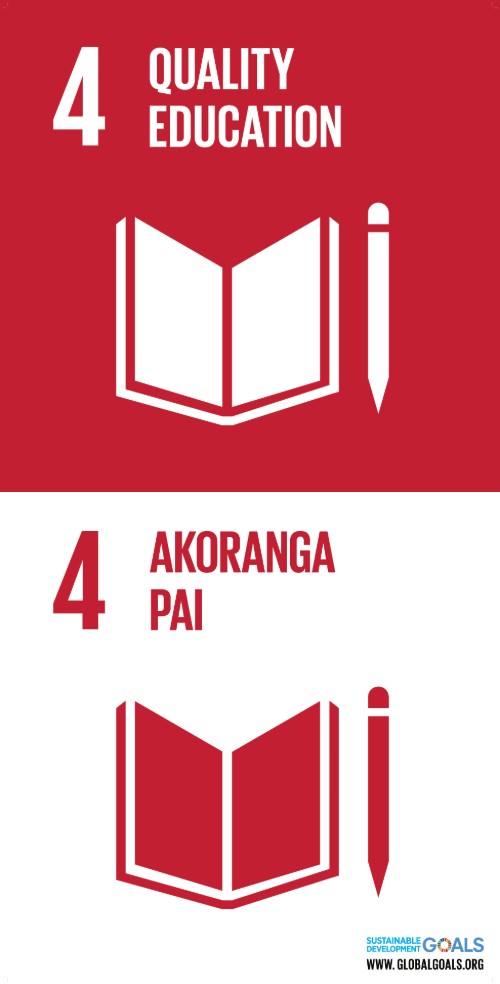 In 2020, we awarded 4,883 qualifications, from undergraduate certificates and diplomas to PhDs. In the same year, 96 percent of our teaching staff were assessed as being good, very good or excellent by our students.
In 2020, we awarded 4,883 qualifications, from undergraduate certificates and diplomas to PhDs. In the same year, 96 percent of our teaching staff were assessed as being good, very good or excellent by our students.
Our Student Learning service works with all students helping them become independent and active learners. They support students to develop writing, thinking, study, and maths skills necessary for success by providing information, workshops, resources, and individual sessions.
The number of students with disabilities at the University is growing, increasing the diversity of our community. Disability Services offers students a broad range of services tailored to their individual needs, including access suites, disability and inclusion advisers, education access plans, and other key services.
Wellington Uni-Professional offers short courses and micro-credentials for working professionals and executives, designed to develop professional skills, improve organisational capability, and enhance employability. There are also many seminars, lectures and educational events that the public are free to attend.
Our Faculty of Education trains early childhood, primary and secondary school teachers. The Faculty addresses education for social, cultural, and ecological justice through researching critical, transformative, and culturally sustaining pedagogies, and bilingual education. It promotes collaborative research with a strong focus on Pacific/Indigenous education.
SDG 5: Mana taurite | Gender Equality
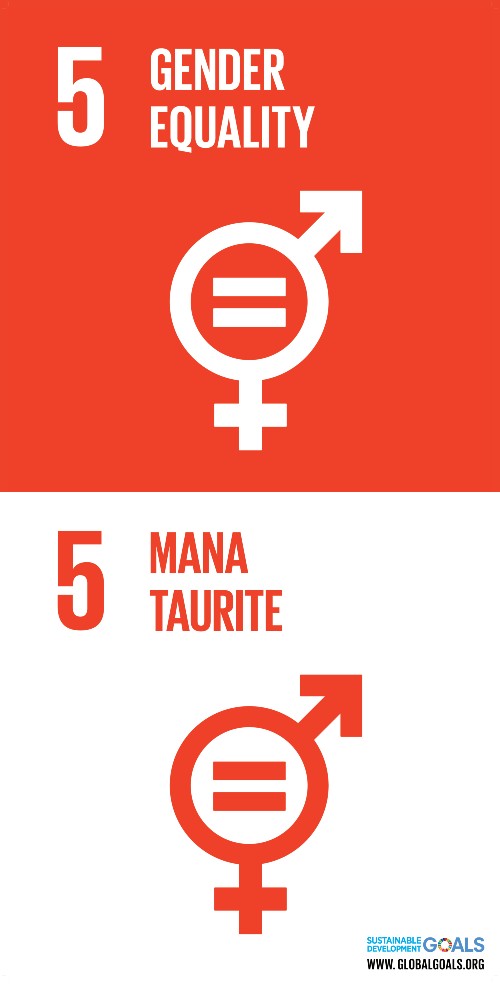 The University is committed to creating an inclusive and supportive environment that values diversity and encourages equitable opportunities for students and staff regardless of gender identity, ethnicity, religious belief, physical capability, status, sexuality or age.
The University is committed to creating an inclusive and supportive environment that values diversity and encourages equitable opportunities for students and staff regardless of gender identity, ethnicity, religious belief, physical capability, status, sexuality or age.
The Equal Employment Opportunities Guidelines (PDF) provides information and guidance to managers and staff enabling equity and diversity across the University. The implementation of these guidelines supports the Equity, Diversity, and Inclusion Framework (PDF).
We have more female students and staff than male. Our academic staff are 46 percent female, and six of the thirteen members of our senior leadership team are female.
The Student Interest Team provides advice and support about responding to threatening, inappropriate, and concerning behaviour and works to respond and resolve issues in a supportive and non-adversarial manner.
University Kids Wellington provides an on-campus 'home away from home' for children of staff and students, taking children from birth to four years old.
SDG 6: Waiwhakaora | Clean Water and Sanitation
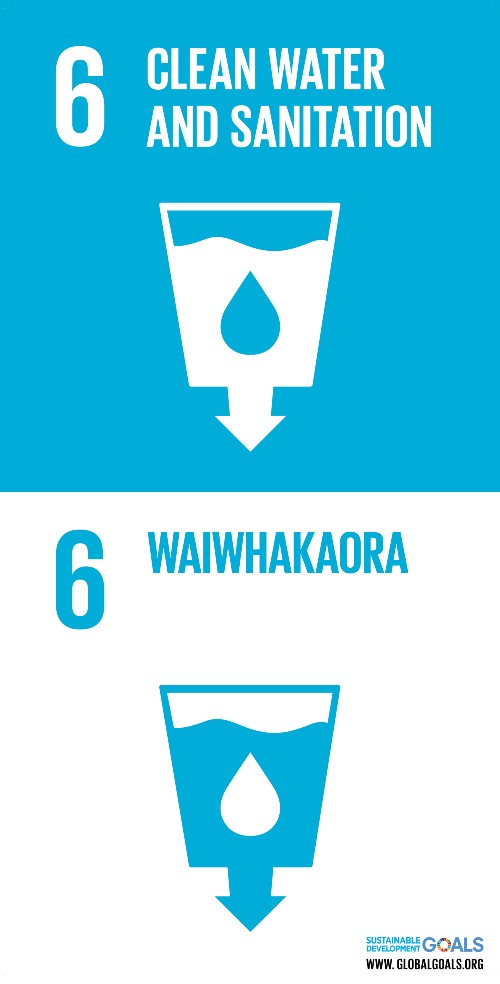 The University is committed to conserving water by upgrading our buildings, infrastructure and equipment. Our water consumption on campus has halved since 2007. The redevelopment of our marae precinct, the Living Pā, will supply 100 percent of its water needs by capturing rain or other closed-loop water systems and by recycling used water. The purpose-built living lab will treat and manage storm water and water discharge, including grey and black water, on site through reuse, a closed loop system, or infiltration.
The University is committed to conserving water by upgrading our buildings, infrastructure and equipment. Our water consumption on campus has halved since 2007. The redevelopment of our marae precinct, the Living Pā, will supply 100 percent of its water needs by capturing rain or other closed-loop water systems and by recycling used water. The purpose-built living lab will treat and manage storm water and water discharge, including grey and black water, on site through reuse, a closed loop system, or infiltration.
Our Institute for Governance and Policy Studies has a focus on policy settings for fresh water quality in Aotearoa. Dr Bethanna Jackson from our School of Geography, Environment and Earth Sciences has developed the Land Utilisation and Capability Indicator (LUCI)—an ecosystem services modelling tool which illustrates the impacts, including water quality, of land use decisions. The ‘Water—Rapuhia, kimihia: Quest for knowledge’ documentary series focuses on three key environmental issues: fresh water quality, sea level rise, and the legal protection of rivers in New Zealand.
SDG 7: Pūngao pai | Affordable and Clean Energy
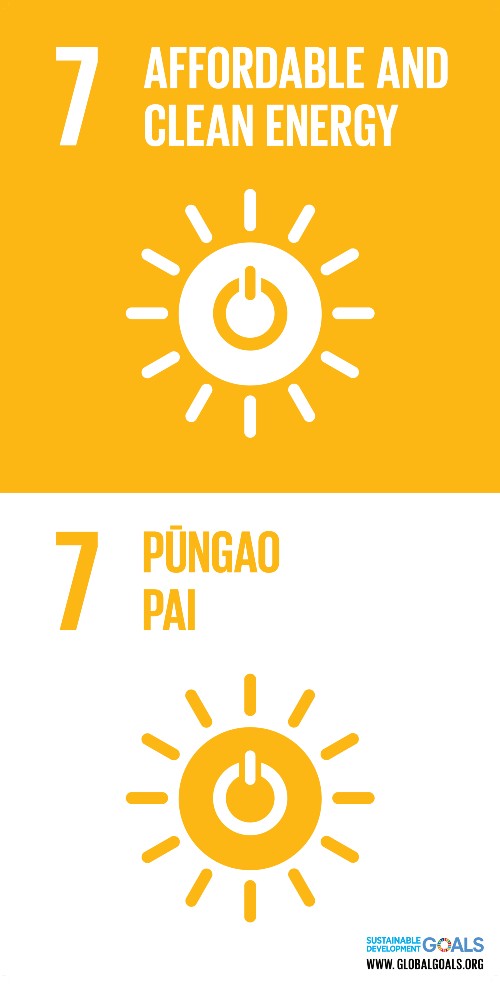 In Aotearoa New Zealand, about 80% of our power comes from hydro, wind, or geothermal. The University is supporting the country’s shift to 100% renewable electricity through our operational practices and our teaching and research.
In Aotearoa New Zealand, about 80% of our power comes from hydro, wind, or geothermal. The University is supporting the country’s shift to 100% renewable electricity through our operational practices and our teaching and research.
We have rooftop solar hot water, solar PV, and wind turbines on campus to generate onsite renewable electricity, with plans for more as part of our Zero Carbon Plan (PDF). Our energy management strategy also includes work to reduce our peak electricity demand, so that we are avoiding electricity use at times when fossil fuelled power generation is needed for the National Grid.
The energy consumption for each of our buildings is available online. We use this information to identify energy wastage by looking for anomalies in energy use patterns and benchmarking energy use across buildings.
Our academic work includes the Renewable Energy Systems programme in the Faculty of Engineering. This relatively new programme helps students learn how to design and create cleaner, more sustainable ways to generate power. The programme is led by our Chair in Sustainable Energy Systems.
We also host the MacDiarmid Institute, a national centre of research excellence for innovative and sustainable materials. Their focus on renewable energy systems and storage will improve the lives of people in Aotearoa and around the world.
We also partner with Wellington City Council to support Climathon, a 24-hour hackathon to kick start new local climate action start-ups.
SDG 8: Whai rawa | Decent Work and Economic Growth
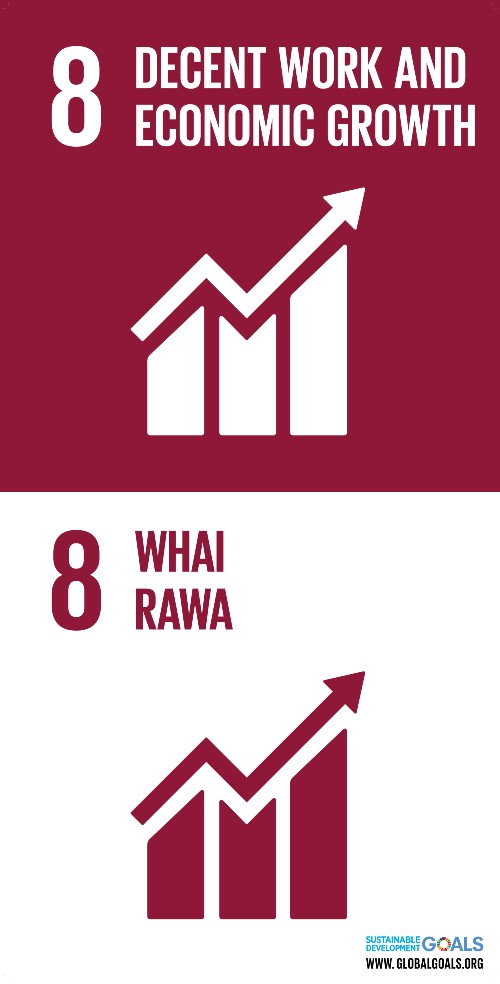 The University plays an important role in supporting an economically prosperous and secure future for our community. With 3,400 employees we are one of the largest employers in Wellington. Our 22,400 students are being provided with an education that sets them up for future employment and enhancing the productivity of Aotearoa and the world. Our research and partnerships are supporting economic development for disadvantaged groups.
The University plays an important role in supporting an economically prosperous and secure future for our community. With 3,400 employees we are one of the largest employers in Wellington. Our 22,400 students are being provided with an education that sets them up for future employment and enhancing the productivity of Aotearoa and the world. Our research and partnerships are supporting economic development for disadvantaged groups.
We are a member of Diversity Works New Zealand. We are recognised as an ‘employer of choice’ because of our commitment to quality employment practices (PDF) and equity of opportunity for all staff and students. We're working towards having all staff on the Living Wage.
Our Careers and Employment team supports students to maximise their employability and helps them find fulfilling work, both during their studies and after graduation. There are an increasing number of internship opportunities for students to gain experience and build relationships with potential employers during their studies.
We’re committed to supporting Māori and Pasifika economic development with targeted and effective research and building the productivity of Aotearoa.
SDG 9: Hanga pai | Industry, Innovation and Infrastructure
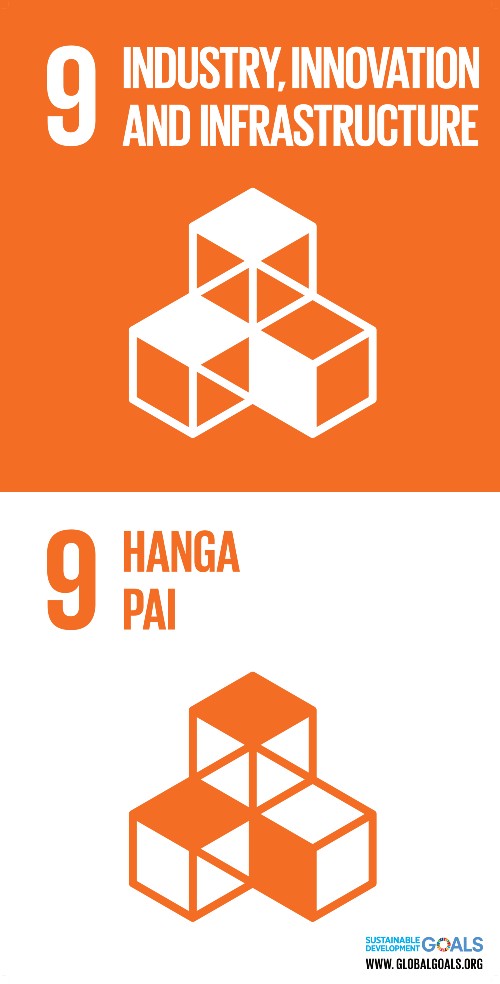 We work closely with industry and government to support sustainable innovation by sharing research and expertise.
We work closely with industry and government to support sustainable innovation by sharing research and expertise.
Wellington UniVentures works side-by-side with our researchers as they advance ground-breaking ideas and inventions. They test them, protect them, and shape them into real-life applications that solve problems and move us all forward.
The Chair in Sustainable Energy Systems supports the future of renewable and sustainable energy in New Zealand and the Asia-Pacific region, including the development of hardware to enable ‘smart’, connected household (nano)-grids, and specifically the potential of DC systems.
The Robinson Research Institute is world-leading in the creation and commercialisation of high temperature superconductivity and enabling ultra-efficient motors. The team works alongside their industry partners. The Institute also works on electromagnetics and materials science.
We also host the MacDiarmid Institute, a national centre of research excellence in the creation of innovative and sustainable materials to improve the lives of people in Aotearoa and around the world. The MacDiarmid's researchers focus on reconfigurable systems inspired by nature to avoid waste, carbon capture and catalysts, and low energy computing materials for data centres. They integrate Mātauranga Māori principles across all of these areas.
Our researchers are also leading thinking on future-defining work in artificial intelligence, evolutionary computation, and machine learning.
SDG 10: Mana ōrite | Reduced Inequalities
 Our University is committed to providing pathways for under-represented groups to attend university.
Our University is committed to providing pathways for under-represented groups to attend university.
The Special Admission pathway is for people over 20 who have relevant work and life experience.
Āwhina is the on-campus whānau for Māori students. Our kaupapa (goal) is to help students successfully make the transition from secondary education or work into tertiary education. We also provide academic support for Māori students enrolled at Te Herenga Waka.
Pasifika students are supported at every step of their University journey by the Pasifika Student Success team which acts as an āiga (family) on campus. The team works alongside other dedicated Pasifika support staff across the University, and provides a wide range of Pasifika student support services to both new and existing students.
The Ngā Hoe a Kupe Pathfinder Scholarships were launched in 2020 to increase the participation and success of Māori, Pasifika, low socio-economic, and refugee-background students. There are also 200 Totoweka Scholarships available to support students from disadvantaged backgrounds.
The University is committed to equity of opportunity for all staff and students. The Equal Employment Opportunities Guidelines (PDF) provide guidance to enable equity and diversity across the University. Our equal employment opportunities support the Equity, Diversity, and Inclusion Framework (PDF), and the Capability Strategy.
Our Access Committee receives annual funds for upgrades and alterations of the University's built environment to remove physical barriers for students, staff, and visitors with impairments.
SDG 11: Hapori ora | Sustainable Cities and Communities
 Our university is not just for students and staff—it’s for everyone. We work with the community, host public events, and share our facilities.
Our university is not just for students and staff—it’s for everyone. We work with the community, host public events, and share our facilities.
The public can browse our library resources, visit our Adam Art Gallery, use our recreational facilities, attend a performance, or chill out at any of the cafés on campus or enjoy our public green space such as the Hunter lawn or the fernery.
Wellington is a great city to get around. We work with local government to provide and support sustainable commuting to the University's campuses. More than 90 percent of our students travel by foot, bike, or public transport to get to campus. We support flexible working for our staff and learning experience options for our students.
We provide more than 3,000 beds for students in our Halls of Residence, all within walking distance of campus, to provide vital accommodation and add to the vibrancy of Wellington City.
Our Campus Master Plan sets out a goal for all new buildings and renovations to embed sustainable design principles and reduce the demand on city services and infrastructure. The best example of this is the Living Pā project, which aims to achieve Living Building Challenge certification—international best practice in sustainable buildings. All of our campuses are inner city so none of our development is on green field sites.
Our School of Architecture has a major focus on design that will increase the wellbeing of people, society, and the ecosystems we dwell in as the world around us changes.
Our internal Sustainable Events Guide helps staff across the University to run better events with reduced carbon footprints and less waste.
SDG 12: Mahi tika | Responsible Consumption and Production
 We are working with our suppliers and our procurement team to make sustainability considerations more prominent in our purchasing decisions. For example, we've switched to reusable glass bottles for milk supply. We are also working with the cafes on campus to reduce takeaway coffee cups.
We are working with our suppliers and our procurement team to make sustainability considerations more prominent in our purchasing decisions. For example, we've switched to reusable glass bottles for milk supply. We are also working with the cafes on campus to reduce takeaway coffee cups.
Our focus on waste minimisation and diversion has seen a 25 percent reduction since 2007 in the waste that goes from campus to landfill. Better management of organic waste can help reduce waste to landfill and carbon emissions, so we are starting to introduce worm farms on campus to turn our food scraps into fertiliser that can be used on our gardens.
Hannah Blumhardt is a senior associate at our Institute of Governance and Policy Studies, who is researching New Zealand's zero waste movement. Her work spans the full range from grassroots to government, and focuses on reaching a waste-free world.
We developed a guide with suggestions for making events greener. The Sustainable Events Guide is a working document, and is regularly updated with new ideas and deals.
For waste minimisation—and all of our sustainability initiatives—we like to be transparent and report on our progress each year through our sustainability report (PDF).
SDG 13: Hiwa āhuarangi | Climate Action
 We are committed to leading climate action. In the decade to 2019 our carbon emissions reduced by 20 percent. With the COVID-19 pandemic, and lack of air travel, emissions have dropped a further 50 percent.
We are committed to leading climate action. In the decade to 2019 our carbon emissions reduced by 20 percent. With the COVID-19 pandemic, and lack of air travel, emissions have dropped a further 50 percent.
We are the first New Zealand university to release a comprehensive emissions management plan towards a net carbon zero future by 2030, integrated with teaching, learning and research opportunities. The five-point emissions reduction plan includes introducing onsite solar power generation, moving heating away from natural gas, and an internal levy for air travel. Half the money from the levy will go to purchase carbon offsets, and the other half into a contestable fund to support carbon reduction initiatives from staff.
We have academic expertise in climate change across the University, including climate science, policy, adaptation, impact, and solutions. Our academic expertise is integrated into our teaching programmes and connects through research centres and institutes.
Climate change is a global issue and we are connecting internationally, nationally, and locally to respond to it:
- We have several lead authors on the intergovernmental panel on climate change.
- We work with research and industry partners all around the world.
- Our students connect with their peers around the world for climate action through our Kitea Impact Programme.
- Professor James Renwick and Dr Judy Lawrence are commissioners for the New Zealand Climate Change Commission.
- We are signatories of the Climate Leaders Coalition.
- We worked with our students to lobby for ambitious national climate targets.
- Locally, we have a strong partnership with Wellington City Council to support the Te Atakura Zero Carbon Capital plan.
- The Growing our Future project is a carbon sharing, native reforestation agreement with the City.
- We have a long relationship with the Greater Wellington Regional Council, which has introduced better public transport services to the University and discounts for students.
SDG 14: Oranga moana | Life below water
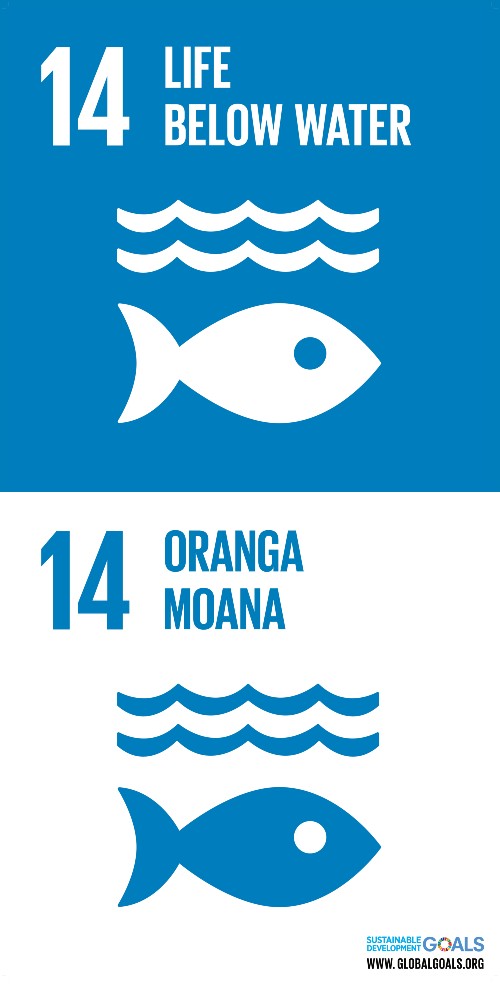 The School of Biological Sciences conducts a wide range of research in marine science. Their research is supported by the award-winning Wellington University Coastal Ecology Lab (WUCEL) on Wellington’s south coast.
The School of Biological Sciences conducts a wide range of research in marine science. Their research is supported by the award-winning Wellington University Coastal Ecology Lab (WUCEL) on Wellington’s south coast.
WUCEL maintains strong collaborative links with research groups at NIWA (National Institute for Water and Atmospheric Science), Cawthron, and the Department of Conservation. WUCEL has annual open days so visitors of all ages can interact with marine creatures, see research equipment in action, ask WUCEL researchers anything they want to know about marine life, and learn about marine biology research from interactive displays.
On campus, we have processes to ensure that we keep any hazardous materials away from wastewater and storm water streams. We take regular samples to ensure our compliance requirements are met.
SDG 15: Oranga whenua | Life on land
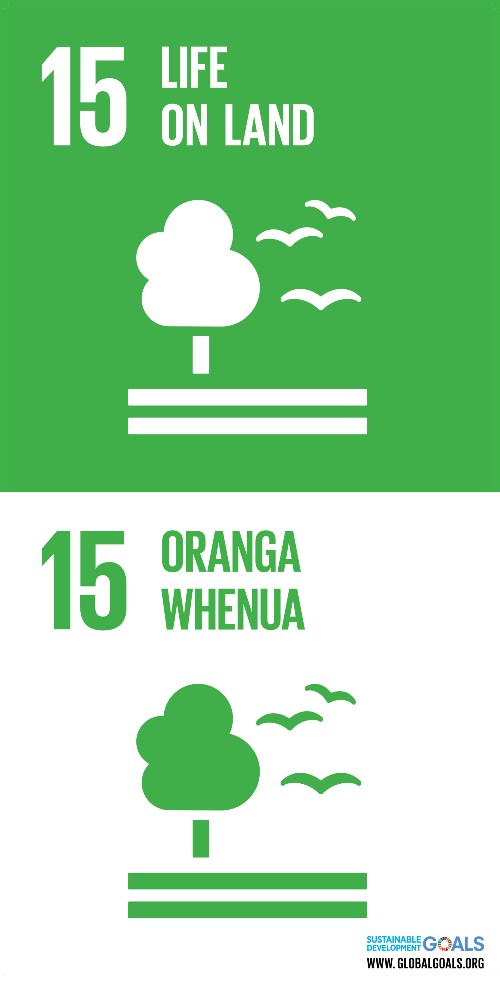 In 2021 the University expanded its tree planting activities in Wellington, providing opportunities for students, staff, and alumni to get involved in ecological restoration and carbon sequestration.
In 2021 the University expanded its tree planting activities in Wellington, providing opportunities for students, staff, and alumni to get involved in ecological restoration and carbon sequestration.
While we are an urban campus with limited green space, our Landscape Management Plan (PDF) still aims to support biodiversity enhancement through removal of weed species and protection of rare and endangered native species.
Our campus green space is open to the public to enjoy.
Our School of Biological Sciences is the home of the Centre for Biodiversity and Restoration Ecology. The team generates new knowledge, strategies, and technologies for better management of biodiversity in urban, farmed, and wilderness landscapes across New Zealand and around the world.
We have a strong research partnership with Zealandia, the world’s first fully-fenced urban ecosanctuary. Our partnership will enhance biodiversity management for conservation, and increase our understanding of how people live with nature in the urban environment.
SDG 16: Hohou rongo | Peace, Justice and Strong Institutions
 As a capital city university, we are well positioned to engage with government to inform good decision-making and demand transparent and democratic governance.
As a capital city university, we are well positioned to engage with government to inform good decision-making and demand transparent and democratic governance.
Our Faculty of Law is New Zealand's leading centre of academic legal research, that spans domestic and international legal policy matters.
Located directly opposite Parliament, our School of Government is ideally situated to help build capacity in New Zealand’s public sector. The school has five research clusters all related to SDG 16: governance and policy, digital government, regulatory practice, restorative justice, and the study of family and children.
Within the University, we have elected representatives on the University Council and the Student Union. We use advisory boards of community stakeholders to inform decision making across the University. We have several governance, academic, and research policies that guide our practice to be ethical, transparent, uncorrupted, and protective of academic freedom.
SDG 17: Mahi tahi | Partnerships for the goals
 We were the first New Zealand university to sign University Commitment to the SDGs. We held the inaugural New Zealand SDG Summit, which brought together all sectors to raise awareness and action on the SDGs. In collaboration with the other New Zealand universities, we partnered with the Ministry of Foreign Affairs & Trade to inform Aotearoa’s first Voluntary National Review on the SDGs.
We were the first New Zealand university to sign University Commitment to the SDGs. We held the inaugural New Zealand SDG Summit, which brought together all sectors to raise awareness and action on the SDGs. In collaboration with the other New Zealand universities, we partnered with the Ministry of Foreign Affairs & Trade to inform Aotearoa’s first Voluntary National Review on the SDGs.
Our School of Business and Government are signatories of the UN Principles for Responsible Management Education and have a focus on facilitating cross-sector connections for the SDGs.
A team of researchers in our School of Government have worked with the government and NGOs to compile the New Zealand Sustainable Development Goals website—a resource to track national progress on the SDG targets and accelerate action.
Our students can learn about issues related to the SDGs through the curriculum across all our faculties. Our two extra-curricular leadership programmes offer the chance for students to connect with the community and their peers around the world on sustainability issues.
In 2019, the Kitea Impact Programme won the 'Benefiting Society' category of the prestigious International Green Gown Awards as recognition of our students' volunteer work in the community. Kitea is for students passionate about leadership, sustainability, global issues, helping the community, and building skills that will look great on your CV.


